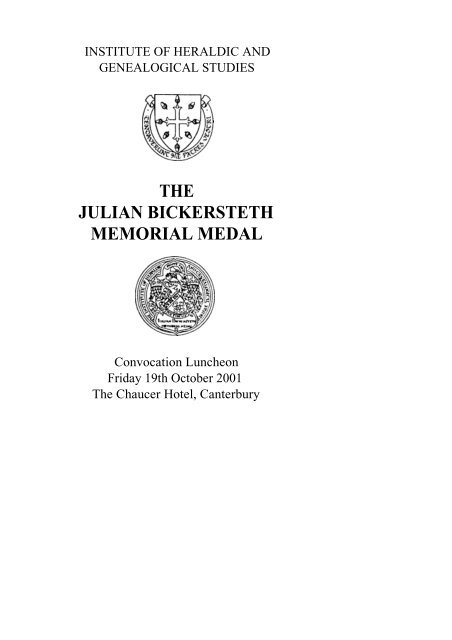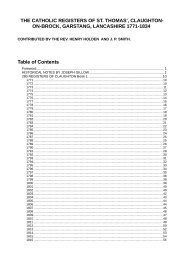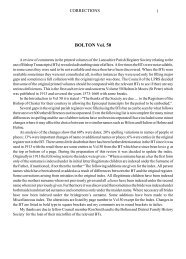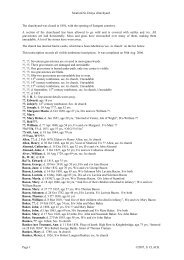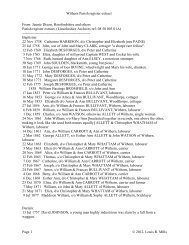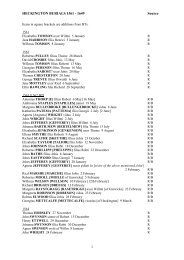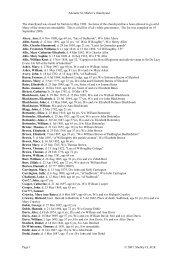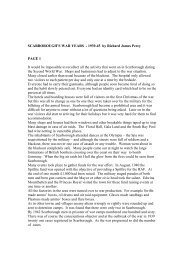THE JULIAN BICKERSTETH MEMORIAL MEDAL - Genuki
THE JULIAN BICKERSTETH MEMORIAL MEDAL - Genuki
THE JULIAN BICKERSTETH MEMORIAL MEDAL - Genuki
You also want an ePaper? Increase the reach of your titles
YUMPU automatically turns print PDFs into web optimized ePapers that Google loves.
INSTITUTE OF HERALDIC AND<br />
GENEALOGICAL STUDIES<br />
<strong>THE</strong><br />
<strong>JULIAN</strong> <strong>BICKERSTETH</strong><br />
<strong>MEMORIAL</strong> <strong>MEDAL</strong><br />
Convocation Luncheon<br />
Friday 19th October 2001<br />
The Chaucer Hotel, Canterbury
<strong>THE</strong> INSTITUTE OF HERALDIC AND<br />
GENEALOGICAL STUDIES<br />
School of Family History 1957<br />
The Institute established in Canterbury 1961<br />
Registered Educational Charity 1964,<br />
No. 313304<br />
Incorporated in England 1982, 1629916.<br />
An educational Charitable Trust for the study of<br />
the history and structure of the family<br />
PATRON -The Duke of Norfolk KG, GCVO, CB, CBE, MC, FSA, Earl Marshal<br />
President Emeritus: The Viscount Monckton of Brenchley<br />
CB, OBE, MC, DL, FSA<br />
President: The Rt Hon. The Earl of Lytton, FRICS<br />
Vice Presidents: The Earl of Errol Lord High Constable of Scotland<br />
H. E. Archbishop Bruno B. Heim<br />
The Revd Canon D. I. Hill, FSA<br />
D. H. B. Chesshyre Esq, LVO, FSA<br />
Chester Herald of Arms<br />
Prof. A. P. Smyth, FSA<br />
<strong>THE</strong> COURT OF TRUSTEES<br />
C. R. J. Humphery-Smith Esq, FSA (Founder and Principal)<br />
J. P. B. Brooke-Little Esq, CVO, FSA<br />
Norroy and Ulster King of Arms<br />
His Honour Judge Giles Rooke, TD, QC<br />
Dr R. E. Lloyd-Roberts, TD (Chairman)<br />
P. de V. Beauclerk-Dewar Esq, RD", JP, FSA (Scot).<br />
W. H. Connell Esq, BA<br />
M. Dexter-Tissington Esq<br />
Prof. I Humphery-Smith<br />
B. Collins, FCA (Hon. Treasurer)<br />
Richard C. F. Baker PhD, DIC, FHG (Director of Studies)<br />
Jeremy Palmer BA ( Registrar)<br />
John S. Titford MA, M-es-L, LHS (Chairman of Examining Board)
<strong>THE</strong> <strong>JULIAN</strong> <strong>BICKERSTETH</strong> <strong>MEMORIAL</strong> <strong>MEDAL</strong><br />
Kenneth Julian Faithful Bickersteth was born at Ripon on the 5th<br />
July 1885, the third son of the late Dr Samuel Bickersteth. Educated at<br />
Rugby, Christchurch, Oxford and Wells Theological College, Julian was<br />
ordained in 1909. He came to Canterbury as Archdeacon of Maidstone in<br />
1943, having had a long career in education, both in England and Australia.<br />
He died on 16th October 1962, having spent his life "doing good just by<br />
being what he was....", as was said by one well qualified to judge.<br />
Julian Bickersteth's interest in education and the young never waned<br />
and it was from these very real promptings that his idea for The Institute of<br />
Heraldic and Genealogical Studies arose as a means of investigating the<br />
history and structure of family life, which he rightly looked upon as forming<br />
the foundation of Christian civilisation. He left the realisation of his aims to<br />
Cecil Humphery-Smith, his godson, whom he had invited to form a school<br />
for family history studies in 1957. An exhibition of artifacts of family life<br />
was brought to Canterbury in 1960 and Julian lived to see the foundation of<br />
the Institute in Northgate in February 1961, enjoying its rapid progress in<br />
teaching and research over the following eighteen months. He waved from<br />
his car congratulations upon the first issue of the journal FAMILY HISTORY<br />
during the month before he died.<br />
In 1964, the Institute was registered as an independent charitable<br />
Trust and Cecil Humphery-Smith provided funds so that the Trustees could<br />
make an appropriate annual award in memory of the man who was the<br />
inspiration and sponsor of the Institute, Julian Bickersteth, The award is<br />
made to persons who have made notable and exemplary contributions to<br />
family history studies in the judgement of and at the discretion of the<br />
Trustees.<br />
The Medal, designed by the donor in the form of a medieval armorial<br />
seal, has the arms of Bickersteth flanked by the Institute's heraldic badge<br />
on the face and an heroic garland of oak leaves surrounding the recipient's<br />
name on the reverse. It is made of hallmarked gilded silver from the original<br />
dye.<br />
The Trustees have awarded the Julian Bickersteth Memorial Medal<br />
to the following individuals at dinner or luncheon parties held in Canterbury,<br />
in London and elsewhere.
Sir Anthony Richard Wagner, KCB, KCVO (died 1995) former Garter<br />
Principal King of Arms was universally acknowledged as one of the foremost<br />
heraldic scholars of his time, responsible for the editing of Rolls of Arms for<br />
the Harleian Aspilogia Series and for the New Dictionary of British<br />
Armorials (New Papworth), as well as for remarkable works on genealogy<br />
and heraldry in the context of history and sociology.<br />
John Philip Brooke-Little, Esq., CVO, sometime Clarenceux King of<br />
Arms, was the founder of The Heraldry Society in 1947 and did much to<br />
popularise interest in heraldry through his many writings and innovation.<br />
He has edited the Coat ofArms for 50 years. He was successor to Professor<br />
Gale as a Trustee of the Institute.<br />
Dr Peter Laslett and Dr E.A. Wrigley (knighted 1998) were pioneers<br />
with the Cambridge group for The History of Population and Social<br />
Structure which has done so much to give us better understanding of the<br />
demography of the country in the historical context of the family.<br />
Professor Robert Cecil Gale (died 1975) was formerly Professor of<br />
Explosives Chemistry at the Woolwich Arsenal. He lived to a great age and<br />
during some thirty years of retirement had spent much of his time indexing<br />
heraldic and genealogical sources, continuing with a lifetime hobby. He<br />
was one of the first eight Trustees of the Institute.<br />
Frederick Humphery-Smith, Esq., MBE, (died 1979) father of the<br />
founder, had a distinguished career in public services and spent his<br />
retirement voluntarily assisting more than thirty charities. He willingly<br />
took on the task as honorary clerk and treasurer to the Institute in 1961 and<br />
had a great deal to do with the foundation of its supporting company,<br />
Achievements Limited, as well as assisting his son in works of transcription<br />
and indexing of heraldic and genealogical works. He had an enquiring mind<br />
in historical subjects and was an assiduous researcher.<br />
Donald John Steel was one of the pioneers who, as a young man,<br />
helped to transform the Society of Genealogists in the 1960s and initiated<br />
the National Index of Parish Register Studies. He was closely involved in<br />
the foundation of the Federation of Family History Societies and took on<br />
an exhausting programme of lecturing throughout the country and abroad,<br />
which did much to promote the family history movement.
Dr William Urry had a keen and inspiring interest in archive research<br />
from an early age and became archivist at Canterbury Cathedral, giving<br />
enormous encouragement to the foundation of the Institute, sharing his<br />
immense knowledge of Kentish records and the resources of the Cathedral<br />
with the founder at the Institute. When he was appointed Reader in<br />
palaeography at the University of Oxford in 1966, he received little<br />
acknowledgement from the City or the Cathedral, but was deemed worthy<br />
of the Julian Bickersteth Memorial Medal, Julian having been his patron<br />
when he was at Canterbury. His work on Thomas Becket was published<br />
posthumously in 1999.<br />
Charles Wilfred Scott-Giles Esq., OBE, (died 1982) ultimately became<br />
Fitzalan Pursuivant of Arms Extraordinary but, while a mechanical engineer,<br />
had done much to popularise heraldry through his books, lectures and<br />
skilfully written essays. Wilfred and Cecil had enjoyed heraldic soirees at<br />
their homes in Sunbury-upon-Thames and Kew before the foundation of<br />
the Institute. Wilfred's skills as heraldic artist and a motivator of interest in<br />
family history studies was widely admired.<br />
Admiral of the Fleet, the Earl Mountbatten of Burma (murdered 1979),<br />
whose honours were legion, had long had great interest in genealogy and<br />
heraldry. He exhibited this in his own researches and privately published<br />
works. An ardent supporter of education and of the pioneer work of the<br />
Institute, he kept in touch by correspondence and supported the foundation<br />
in every possible way, particularly by taking on the presidency of The<br />
Society of Genealogists and establishing a friendship which had been<br />
partially lost following the death of the late George Sherwood, the founder<br />
of the Society. Earl Mountbatten visited us in 1972 and willingly took on<br />
the co-patronage of the International Congress, held in London in 1976<br />
and organised by the Institute.<br />
Francis W. Steer (died 1978), sometime Maltravers Herald<br />
Extraordinary, was archivist to the Duke of Norfolk at Arundel Castle, but<br />
formerly Sussex County Archivist and Archivist and Historian at New<br />
College Oxford and of The Society of Scriveners of the City of London. A<br />
prolific researcher and writer of local history, he undertook research to<br />
publish a catalogue of the records of the heralds at The College of Arms<br />
and the Earl Marshal's papers at Arundel, while assisting many family<br />
historians in the early years of the movement.
Dr F.G. (Derick) Emmison, MBE, (died 1995) was a pioneer County<br />
Archivist and Record Officer who probably excelled all others in the<br />
transcription and translation of documents of immense value to genealogical<br />
research. Concentrating on his counties of Bedfordshire and Essex, he<br />
catalogued and calendared wills, transcribing numerous volumes,<br />
particularly in connection with the latter county, out of which he described<br />
in vivid details Elizabethan life. He was one of the first really to put the<br />
flesh on the bones of genealogy with the substance of family history taken<br />
from original records. He gave enormous encouragement to genealogists<br />
and amateur local historians with an avuncular attitude towards the young.<br />
Sir Andrew Noble, Baronet, KCMG, (died 1987). Paddy Noble, on<br />
retirement from the Diplomatic Service, came to live in Kensington and<br />
immediately took up the role of Chairman of the Council of the Irish<br />
Genealogical Research Society from who our founder had held the seat for<br />
some dozen years (with no Irish connections and never having been there!).<br />
Sir Andrew's own interest was genealogical and he put immense effort into<br />
the writing of the history of his own family. He was quickly persuaded to<br />
become involved in leading the Society of Genealogists and with the work<br />
of the Institute in promoting the holding of the 13th International Congress<br />
in England, which eventually was held in 1976. Sir Andrew steered the<br />
organisation committee through a troublesome period of non-co-operation<br />
from those who should have been supporting and his diplomatic skills<br />
were rightly recognised as a contribution to family history studies as much<br />
as his personal interest in the subject.<br />
Lieutenant Colonel lain Spencer Swinnerton, T.D., was a longserving<br />
soldier with a very keen interest in genealogy and heraldry,<br />
particularly of his own family. He had long been associated with the<br />
Birmingham and Midland Society for Genealogy and Heraldry. After the<br />
Federation of Family History Societies had been founded at the 1974<br />
Congress hosted by the Institute in Canterbury, he was invited to take the<br />
chair. His skill and enthusiasm took the federation to great heights over a<br />
very short period of time and gave enormous support to the International<br />
Congress movement, as well as to many family history societies which<br />
grew up around it. Colonel Swinnerton succeeded the Reverend Godfrey<br />
Beaumont as a Trustee of the Institute and continued until his retirement.<br />
Monsieur Leon Mquier (died 1997) served assiduously and<br />
pleasantly as president of the Academie Internationale d'H&raldique in
succession to the late Paul Adam Even. Leon Jequier had previously been<br />
president of the Swiss Heraldic Society where he had encountered the late<br />
Donald Lindsey Galbreath. A prolific transcriber of armorials and writer on<br />
armorial matters, as well as a frequent attender at international congresses,<br />
Leon Jdquier produced a new edition of Galbreath's Manuel du Blason on<br />
the occasion of the 25th anniversary of the foundation of the Academy. A<br />
work of immense scholarship but incomparably readable, Leon Jequier's<br />
contribution was in many ways beyond compare.<br />
Major Francis Jones, CVO, First Wales Herald Extraordinary, (died<br />
1993) made unique contributions to the study of Welsh heraldry and<br />
genealogy publications and the investiture of the Prince of Wales.<br />
Peter C. Bartrum, though of no Welsh ancestry, taught himself the<br />
language and produced many scholarly works and the definitive pedigrees<br />
of Welsh families. Wales has seen no greater genealogist, one who could<br />
even put the works of Sir Samuel Rushmeyrick and Lewys Dwnn into<br />
scholarly perspective.<br />
Sir Colin Cole, KCB, KCVO, sometime Garter Principal King ofArms,<br />
was one of the founding lights in The Heraldry Society, Portcullis Pursuivant<br />
Extraordinary at the Coronation and an advocate in the Court of Chivalry<br />
proceedings of 1954. A scholar in heraldic and genealogical matters, though<br />
with much too little published, Colin's encouragement of the study of family<br />
history by his committee work in many societies and endeavours merited<br />
his award. He was a founding Fellow and Trustee of the Institute until his<br />
retirement in 1995.<br />
Sir lain Moncrieffe of that Ilk, CVO, QC, (died 1985) was a genealogist<br />
and heraldist of immense reputation who had done much with Simple<br />
Heraldry and other publications to popularise the subjects, both north of<br />
the border and universally. A great friend of armorials and genealogists<br />
universally, he was greatly acclaimed for his knowledge and scholarship.<br />
Dr Mark Fitch, CBE, (died 1994), a business-man of considerable<br />
acumen, had genealogical research as his hobby, but contributed much to<br />
it, not only in funding, but also in personally transcribing many original<br />
sources and supporting the work of the British Record Society.
G.D. Squibb, MVO, QC, (died 1994) was a prominent lawyer and<br />
sometime Norfolk Herald Extraordinary, having also been an advocate in<br />
the Court of Chivalry case of 1954. He transcribed and edited Heralds'<br />
Visitation records to the end of his life, as well as contributing much to the<br />
New Papworth, and to the study of the Heralds and The College of Arms.<br />
Jiri Louda is an heraldic researcher and artist of great merit. To the<br />
English speaking world his production of the illustrations for Lines of<br />
Succession with Michael Maclagan is unparalleled but his work has extended<br />
to civil heraldry in Czechoslovakia and to the stall plates of the Knights of<br />
the Garter. As an heraldic artist, he has few equals.<br />
The Duke of Norfolk, Earl Marshal, KG, GCVO, CB, CBE, MC, FSA,<br />
has not only encouraged and supported the heralds and preservation of<br />
ceremonials throughout his long term of office, but has patronised the<br />
world of genealogy and heraldry generally. As patron of the Institute in<br />
succession to the late Archbishop of Canterbury, Dr Michael Ramsay, and<br />
as president of The Heraldry Society and a vice-president of The Society of<br />
Genealogists, he has been active in our fields of study. He gave tremendous<br />
support as co-patron of the 1976 International Congress, held in London,<br />
and his support for family history studies and the Institute are most gratefully<br />
acknowledged.<br />
Cecil R.J. Humphery-Smith pioneered the family history movement,<br />
founded the Institute, began the British Vital Records Index in 1959, has<br />
edited the Institute's journal, FAMILY HISTORY, since 1962, and lectures<br />
and writes prolifically on the related subjects. He has been voluntary<br />
principal since the outset, making many contributions to the progress of<br />
the Institute. The President and his fellow Trustees insisted on the award.<br />
Dr Bruno B. Heim, Archbishop of Xanthus, a long-standing member<br />
of the Council of the Academie Internationale d'Heraldique and of the<br />
Swiss Heraldic Society, has written and illustrated works of scholarship in<br />
heraldry, both its lore and law. His Heraldry in the Catholic Church, his<br />
Armorial Liber Amicorum and Or and Argent are works of considerable<br />
scholarship. He is a vice-president of the Institute and patron of the<br />
Cambridge University Heraldic and Genealogical Society in succession to<br />
the late Lord Mountbatten.
Monsieur Roger Harmignies has served as secretary general of the<br />
International Congress Permanent Bureau and of the Confederation<br />
Internationale d'Heraldique and of the Academie Internationale<br />
d'Heraldique, as well as of Belgian societies. He is a scholarly writer on<br />
heraldic and genealogical studies, organising the International Congresses<br />
in Brussels and Liege, as well as encouraging international communications<br />
with Britain and North America.<br />
Dr Arlene Eakle is a pioneering teacher of family history studies in<br />
the United States of America who has done much to raise professional<br />
standards in genealogy world wide.<br />
The Hon. Sir George Bellew, KCB, KCVO, former Garter King of<br />
Arms (died 1993) was an enthusiastic designer of armorial bearings and a<br />
writer on our subjects who installed amusement and good humour with<br />
exceptional scholarship.<br />
Michael Maclagan Esq., CVO, former Richmond Herald, is one of<br />
the foremost scholars in genealogy and heraldry who has done much, with<br />
modesty, to promote academic and popular interest in them.<br />
Terrick Fitzhugh (died 1996) was a leading lecturer and author on<br />
genealogy who promoted popular amateur interest.<br />
Szabolcs de Vajay, sometime President of La Confederation de<br />
Genealogie et d'Heraldique has produced more works of scholarship on<br />
these subjects in several languages through more than 50 years. He has<br />
enhanced the recognition of the Confederation as the leading body in the<br />
academic field with UNESCO links.<br />
Peter Wilson Coldham has built up a prominent reputation as a<br />
skilled researcher and author of several important books on the subject of<br />
migration from England to the New World.<br />
Dr Michael P. Siddons, Wales Herald Extraordinary, gave up a,<br />
longstanding career in medicine to devote his efforts to studies in Welsh<br />
heraldry and genealogy producing several publications which are already<br />
classics.
Jeremy S.W. Gibson has led the course of transcribing sources for<br />
family historians and is a prolific producer of a formidable range of thoroughly<br />
researched and comprehensive compilations to aid family and local<br />
historians.<br />
Dr Jean-Claude Loutsch, President of l'Academie Internationale<br />
d'Heraldique in succession to the late Leon Jequier, is an heraldic scholar<br />
of eminence who has enhanced medieval studies in the subject and to<br />
encourage younger enthusiasts.<br />
The Genealogical Society of Utah is a department of the Church of<br />
Jesus Christ of Latter Day Saints. It has made remarkable contributions to<br />
our studies, converting our own British Vital Records Index into something<br />
nearer a reality and co-operating actively and generously with the family<br />
history movement world wide.<br />
Brian Frith Esq., MBE, is one of the longest serving professional<br />
genealogists who has transcribed and published many works of great value<br />
to local historians, especially in Gloucestershire. His work has been an<br />
example to all.<br />
Major General The Viscount Monckton of Brenchley, CB, OBE, MC,<br />
FSA, has been a keen genealogist, heraldist, archaeologist and local historian<br />
since childhood. He supported the foundation of the Institute from the<br />
start, becoming president in succession to the late Marchese Bernardo<br />
Patrizi and one of the first Trustees. His loyalty, attachment and record of<br />
commitment and attendance have been exemplary. The Trustees<br />
unanimously awarded an extra medal on the occasion of the 40th anniversary.<br />
Gerald Joseph Brault is a university professor and philologist who<br />
has devoted many years to the study of the Arthurian romances among<br />
medieval French literature. This interest brought him into contact with<br />
heraldry. His remarkable and authoritative publications on the language of<br />
armory and on the Rolls of Arms of the reign of Edward I will remain classic<br />
texts.<br />
Clifford Reginald Webb has spent a life-time transcribing and indexing<br />
registers and records for genealogical and local history research. He has<br />
been General Editor of the National Index of Parish Registers since 1985<br />
and serves as an editor with the British Record Society. His particular<br />
contribution to our studies has been in the interests of those researching<br />
among London records with his lists, indexes and research guides.
John Archibald Goodall was, for many years, personal research<br />
assistant to Sir Anthony Wagner, the late Garter King of Arms. He<br />
specialised in medieval heraldry and was elected a fellow of the Society of<br />
Antiquaries in 1969. In 1995 he received the Society of Antiquaries Gold<br />
Medal for his academic contributions to the work of the Society.<br />
GENUKI is the major internet resource for genealogical information<br />
relating to the the United Kingdom and Ireland. From its beginnings in<br />
1994, it now comprises over 30,000 pages of freely available information,<br />
together with a growing number of indexes and transcriptions of historical<br />
records. As a charitable association with a network of county<br />
representatives, the organisation encourages the spirit of the family history<br />
movement. With genealogy being a significant interest topic of the internet,<br />
the resources made available by GENUKI are sure to become more and more<br />
in demand as time progresses.


